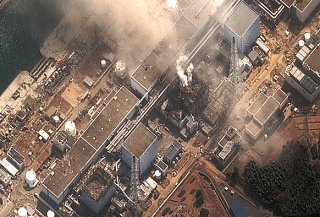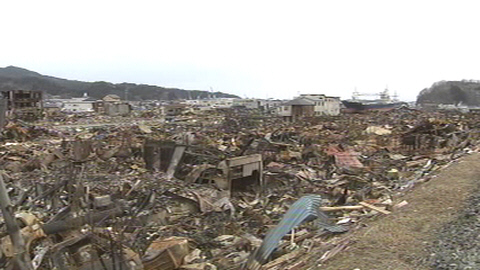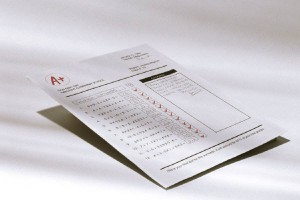The Great East Japan Disaster Part Two: Nuclear Accident
Continuing my account of the March 2011 disaster. See Part One for the beginning of the tale.
Part Two: Nuclear Accident
Around 6pm on Saturday evening (the day after the earthquake), just after we had eaten and just as we were thinking about going to bed (with no power and no heat, you quickly revert to a more natural sleep cycle!), our phone rang. Now, given that we had no power and the phones were supposed to be out, this was fairly surprising.
We actually got phone calls from two people that evening: my uncle in the UK, and my godfather in Germany. Both were calling because of initial reports of the nuclear power plant accident in Fukushima.
There wasn’t much information at that point, just reports that the cooling systems were broken and the reactors might be breached. I talked to both of them briefly, then hung up and went to talk to my family. Before convincing them though, I had to convince myself. Remember, I had spent seven hours driving a 30km round trip the day before. I knew how the roads would end up if everyone in Sendai decided to evacuate. We wouldn’t get ten miles…
That’s what decided it for me. Go now, or risk never being able to go. We had to leave immediately.
The other factor was to run through the possible outcomes of the decision. I first remember seeing this in a video about climate change, of all things. You can check it out here.
I did the same thing with our possible escape. Run away/stay put. Nuclear accident is harmless/catastrophic. Made a funky box decision matrix thing, and compared the worst case scenarios: we ran away and the nuclear accident was harmless. We feel a bit silly, it costs us some money. We didn’t run away, and the nuclear accident was catastrophic. Hollywood disaster movie ensues, with us as extras (ie not the people that get picked up in the presidential helicopter just in time).
Once I got that clear in my head, I quickly persuaded my wife and kids. We decided to leave immediately, except that my wife didn’t want to leave her parents behind, so we sent one of the girls to get them. Another of them had gone to take some food to her colleagues just before we got the phone calls, so we had to wait for her too.
It was a tense wait, sitting around the kerosene stove. We put the candles out to save them and grabbed a change of clothes and some personal items. I couldn’t find my youngest daughter’s passport, and the eldest’s one had expired. Figured we could sort something out later.
Coincidentally, my wife’s cousin who lives in Kanazawa on the other side of Japan called her just after the earthquake and before the phones went down, offering her a place for us to stay. We decided to head that way as I had a vague notion to head for Osaka and ultimately abroad to Thailand or the UK if things went really bad, and Kanazawa is on the way to Osaka (and more than 600km from the nuclear reactor across a major mountain range). It seemed to be a good choice.
A good two hours later, my parents in law showed up. Apparently it wasn’t traffic, but rather the fact that it took that long to persuade them to come with us that had caused the delay. They didn’t really see the problem, didn’t want to go (especially in the middle of the night), and were not convinced there was a problem. After all, the government was saying it was okay…
After pacifying them, we sent them off first with two of the girls at about 22:30, telling them to drive across to the Sea of Japan, then down the coast to Kanazawa. The one huge problem was fuel, as shortages, damaged petrol stations, power cuts, and panic buying had rendered it almost impossible to find in Sendai. I figured we’d find some once we got out of the earthquake zone.
So we waited for our eldest to come back. And waited. And waited some more. At around 0:30 my wife went to bed while I stayed up. It was 2am when our daughter came back, so I quickly told her what was going on, gave her ten minutes to pack, and got my wife up.
Jumping into the car, we looked at the half-full petrol tank and thought about distances and routes.
Before we left, we set out as much water and food for our cats as we could, then said goodbye to them.
The Great East Japan Disaster Part One: Earthquake
Okay, so I am going to hijack my own blog to shamelessly share some thoughts and experiences from the last few weeks. This is partly in order to give myself an outlet, as well as to provide an easily accessible record I can refer friends and family to. Don’t worry, we’ll be going back to educational topics soon enough.
Part One: Earthquake
When the earthquake happened I was in one of the Cambridge English classrooms. I was supposed to be observing a kids’ class from 15:40, as one of our teachers was leaving, and we were just setting up and cleaning the classroom.
At 14:46 the earthquake started. For a week or so beforehand, we’d had a series of smaller earthquakes, so we weren’t particularly worried. I moved to the back door and opened it and the other teacher did the same at the front. However, the shaking continued much longer than usual, and got stronger and stronger. It got to the point where we had to force ourselves not to run outside (leaving the building during an earthquake is usually more dangerous as you are more likely to be injured by falling objects or broken glass than by a building collapse).
The earthquake had gone on for several minutes, when suddenly there was a sharp sideways motion, and everything in the room that wasn’t fixed down (and a few things that were, like shelves that were screwed into the wall) flew sideways. Computers, printer, plant pots, and hundreds of books were launched into the air and ended up in big piles on the floor.
Thankfully, it stopped shortly after that.
Walking outside, we went to check on friends who run a restaurant nearby. They were fine, but the restaurant was a real mess, with broken glasses and bottles everywhere. We decided to wait outside in a nearby park, away from power lines and buildings, just in case.
It was a very cold day, not the kind of weather you want to be standing outside in the cold for. We did that for an hour or so and experienced several aftershocks. Then it started snowing, so we set off for home by car. The roads were jammed, and damaged in places. Some sections were cracked, or bulged up, or had collapsed. I tried to call or email my family, but everything was down (after an earthquake, everyone tries to call at once and the system gets overloaded). Fortunately, Facebook was working so managed to get in touch with family and friends that way.
Social networks really came into their own during the disaster, allowing people to keep in touch and organise themselves.
Anyway, after two hours in stop-start traffic, we got home. The power was out throughout the city, so none of the traffic lights worked. Surprisingly, there were no accidents and everyone became really considerate drivers. Once it got dark the streets became dangerous, as the streetlights were also out. Pedestrians and cyclists were almost impossible to see. Lines of people formed at public phones, as they seemed to still be working.
At home we broke out some candles and tried to keep warm. Our house is quite old, so we have several kerosene heaters. Most of them require electricity, but luckily two of them are the old stove type so we managed to get them going.
It was pretty eerie: the blacked out silent city where the only noises were the sirens of emergency vehicles in the distance. It was the first time I saw the stars in Sendai.
That evening we went to our local refuge (each neighborhood in Japan has a designated place people should go to in a disaster -usually a school) but they didn’t have any food or water yet. We also went to check on another of our teachers, as well as family members. What should have been an hour’s drive took seven hours, and we got back home at 3am.
At one point we had to drive through water (in Nakano Sakae near Tagajo) but we had no idea of the significance. With no power we were not getting much news so we had no idea of the true scale of the tragedy on the coast. Despite the blackouts, we didn’t think too much of the earthquake as there was not much damage to buildings: they held up incredibly well.
The next day we again drove out to check on our classrooms and one of the girls’ apartment, taking food and drink and leaving everything else. We managed to find an open shop where we bought vegetables and were feeling quite positive by the time we got home. Cooking on the kerosene heaters was slow but worked, and we had a simple dinner of fish and vegetables, which was great after 24 hours of eating chocolate and snacks.
Full, warm, and safe, we faced our second night after the earthquake in good spirits (remember, we still had no real news about the scale of things).
business expectations life in Japan living in Japan presentations Review teaching university
by sendaiben
1 comment
Annual Review
I’ve been doing an annual review of the year, as well as looking ahead to 2011, and it’s been incredibly useful.
I’ve managed to do both much more, and much less, than I thought. Here is the 30-second report card:
- (A+) presentations and general exposure a big win: I presented a LOT this year, and really enjoyed meeting people at conferences all over Japan. Hoping to continue that next year
- (A) Cambridge English a solid satisfactory: we grew about 50% and greatly improved our programs
- (B) university work went well: my classes need work but are improving
- (B-) I completed all my MA assignments for the year, albeit at the bare minimum level
- (C) I did not write nearly enough, and didn’t manage to finish a couple of really interesting projects
- (D) my work/life balance is still completely out of whack, although I did manage to start watching my diet/exercising
How was your year? More importantly, what can it tell you about how to approach 2011?
business EFL eikaiwa expectations living in Japan school management
by sendaiben
1 comment
English Teachers -scarily spot on
Something a bit lighter today (it is Saturday, after all). A web-based comedy series with surprisingly good production values came out earlier in the year. They are updating it gradually, and episode four came out a couple of days ago.
Here is the first episode. I used to work in a sleazy eikaiwa school in Sendai, so this rings so true at points…
I love Japan
So far during my ten years in Japan I have tended to focus on things that annoy me about my life here. Some of them are universal, and some more specific to Japan or Sendai. I’m sure everyone has their own list.
However, recently I have found myself appreciating my life here. I really do feel at home, and enjoy almost everything I do.
Keeping that in mind makes the small annoying things much less important.
I just wanted this on the record in case people had the wrong impression from the amount of moaning I do on debito.org and other websites.
(I took this photo myself earlier this summer, by the way)


